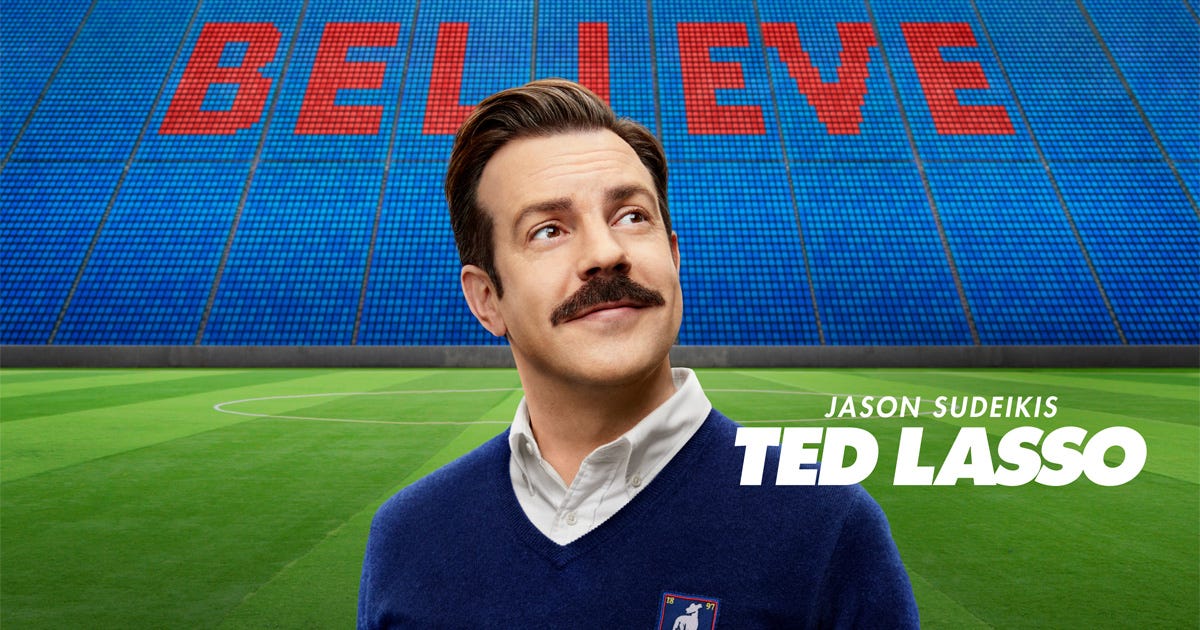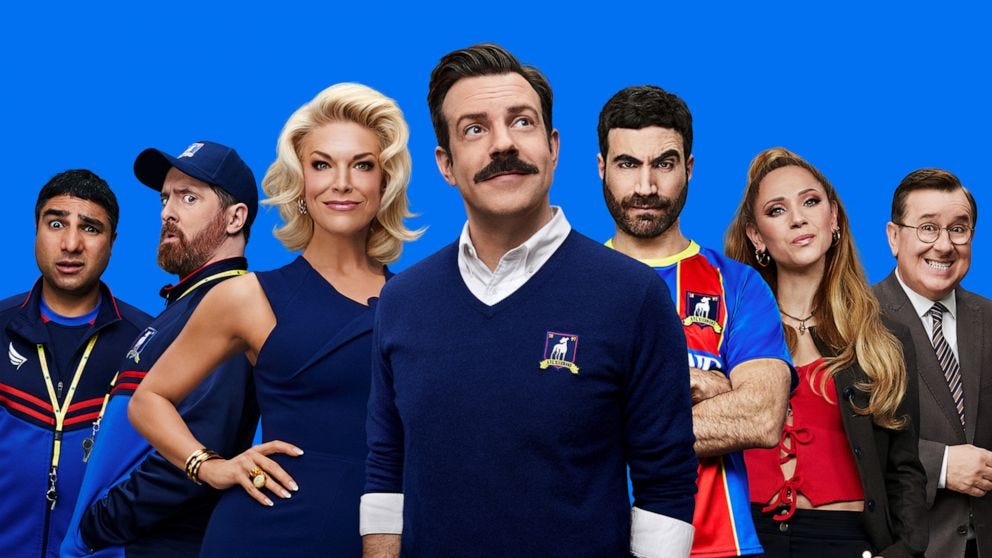Ted Lasso: Is therapy an unsatisfying redeemer?
Therapy culture can make us feel better, but does it bring purpose?
I recently finished the final season of Ted Lasso, Apple’s wunderkind show that started out as a sitcom extolling the delight of being nice to people in the dark days of 2020 when everyone was being treated inhumanely. The show’s first season had crisp, hilarious writing, and endearing characters who brought to life the wonderful differences between American and English sensibilities and understanding of football/soccer. And from the beginning the show displayed a very obvious bent towards popular therapy culture; diagnosing a soccer player’s immense ego as insecurity issues, a wealthy team owner who didn’t want her team to win, but tank just to hurt her ex-husband because he loved the team so much. To counteract the first season’s hilarious take on positivity over competition, in the second season the title character of Ted experienced panic attacks and was shown on screen in his therapy appointments, because of course his positivity was actually toxic, an expression of the control he desperately wanted to have in any area of his life. And by the third season, with bloated episodes running at over an hour, the show felt at times that the American Psychologists Associations had more promotional placement than Apple itself.
Obviously therapy itself is not the problem here. Who amongst us in the year of Our Lord 2023 has not needed or benefited from therapy? If we ourselves haven’t experienced therapy, the overwhelming tide of therapy speak has all but overtaken common parlance. A keystone to Millennial culture is saying that therapy is great and necessary on cue. It’s hardly surprising that the zeitgeist tv show written, produced, and starring millennials has the hallmark of being big into therapy.
While Ted Lasso has been highly entertaining, and at its best produced tears of laughter in its audience from its eclectic cast of characters, it doesn’t come with much in the way of philosophy. It feels difficult to dig for deeper ideas than “therapy is good” or, “compassion and understanding for others is important” or even, “kindness can be funny and relevant!” And that kindness displayed with earnest pathos is a great change of pace to see in the prestige television world that has been inundated with anti-heroes and violence for over a decade. Maybe a tv show doesn’t need to more to say than that! It would be silly to say that part of the massive popularity of the show has been in no small part to the compassionate and caring message that it exudes.
After watching the series finale though, I couldn’t help but feel that the happiest ending the characters were left with was to be a good person and carve out what happiness they could from their own personal growth and the combined growth in those around them. In our post-modern world the show was careful to avoid happily-ever-after endings for the characters, but even still one couldn’t help but feel although most of the characters had experienced personal growth over the course of three seasons, they still had not found fulfillment and purpose past that of self improvement and getting along better with those around them. Roy Kent even questions if people are even capable of change in the last episode! While Ted makes the right choice to return to America to be a father to his son, he does so with the bittersweet knowledge of leaving his friends and career behind in England. He’s still a work in progress, and again, while this feels realistic it also somehow feels as if purpose and fulfillment are missing.
Psychology comes from the Greek word psyche meaning soul, but the understanding of what the soul is and its ultimate purpose is the unspoken problem Ted Lasso and our culture in general will not acknowledge. If the soul is simply here for a good time, not a long time then is the best we as human beings to hope for just feeling good and getting along with others? Are we just on the treadmill of self improvement for our entire lifetimes? If self knowledge is the goal, what happens when we discover that we ourselves are ultimately flawed and cannot be fixed through trying our best or coming to terms with our trauma?
We can pursue greater understanding of how we see the world and respond to it through therapy. In therapy we can better learn to forgive others for injury and hurt they have caused. We can learn to understand how we react to situations and why. Therapy can give us many useful tools and genuine help in understanding ourselves; helping us grow, change, and heal. But therapy cannot redeem our souls. Therapy cannot forgive our sins or offer us eternal life. Therapy alone cannot prepare us for eternity, or offer us unconditional love from the Creator of the universe. The human soul and its spiritual needs cannot be satisfied by therapy.
Of course, it isn’t just therapy culture that is contributing to our general dissatisfaction and spiritual malaise that our society is experiencing in general, but it is interesting that the show that centred itself so strongly upon therapy culture has a pervading sense of longing for fulfillment. Ted Lasso gets a lot of things right, and I believe that is part of why it has been so popular in such a trying time. Humans are made to live in community, we are made for happiness, and we can and should use the tools of psychology and therapy to help us become more fully ourselves. But we are also made for eternity, to be eternally loved by a God who has come to earth as man, and redeemed us from our sins. We can live in a way that denies this spiritual reality, but we will also live with unsatisfactory redeemers we look to for solace.






Thanks for sharing! I didn't know if I wanted to watch the final season and I don't think I will.
Yesss. Reminds me of this, which you would probably enjoy: https://www.backagainwords.com/p/cracks-in-the-therapeutic
edited to say, I realized it has been paywalled since I last read it!